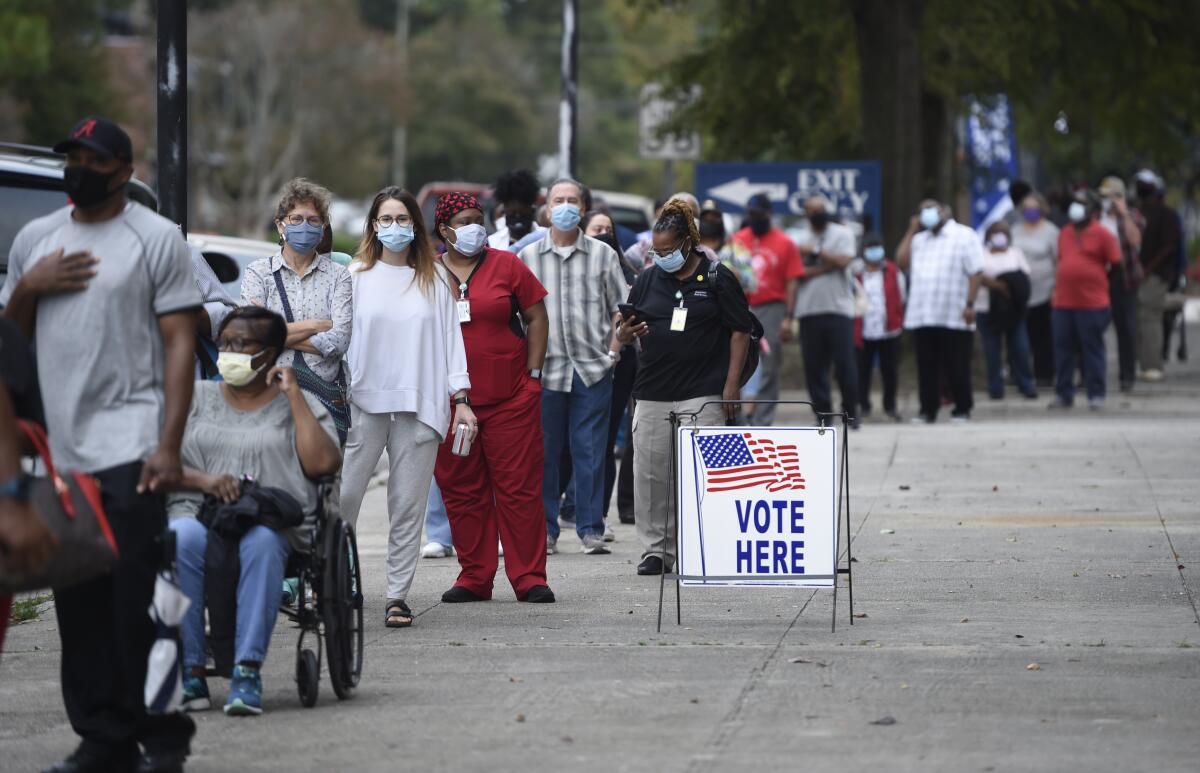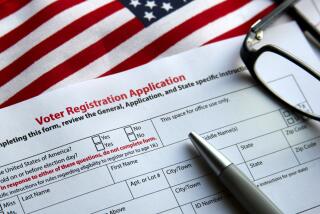Column: Voter suppression will be the lasting effect of Trump’s Big Lie

- Share via
If you’ve ever wondered how racism gets baked into the system, you need only look at the way panicked Republicans around the country are trying to change voting laws.
Last November, record numbers of citizens voted — and, because of the pandemic, a record number cast their ballots by mail. Why risk standing in a line with unvaccinated strangers when you could safely take your ballot to the post office or drop it in an official voting box?
In the aftermath of a resounding defeat, President Trump and his enablers didn’t question their campaign or its message; instead, they launched bogus attacks on the integrity of voting systems in cities such as Detroit, Atlanta and Philadelphia, places that not so coincidentally have large or majority Black populations who voted for Joe Biden by a wide margin.
We watched as the Big Lie that the election was stolen produced a failed series of lawsuits, increasing paranoia among the Republican electorate and ever-wackier conspiracy theories about voting machines and ballot boxes, all of which led to the white supremacist-fueled catastrophe at the Capitol on Jan. 6.
At that point, the fires set by Trump should have been extinguished. But like burning embers, his lies continue to singe the minds of Republicans, who have seized on the idea that erecting barriers to voting is the only way to save the party.
“Mail-in balloting is a nightmare for us,” Republican Sen. Lindsey Graham told Fox News a few days after the Nov. 4 election. If states did not move to make changes, he said, “we’re going to lose the ability to elect a Republican in this country.”
States wasted no time.
Dozens of Republican-majority legislatures got busy. Under the guise of making elections more secure, they launched an all-out effort to make absentee voting more difficult, impose stricter voter ID requirements and cut back on early voting. As of March 24, according to the nonpartisan Brennan Center for Justice, legislators in 47 states have introduced 361 bills with restrictive voting provisions.
And Republican Georgia Gov. Brian Kemp has already signed into law what the Brennan Center describes as an “omnibus voter suppression bill.”
Voting rights activist Stacey Abrams, a force in Georgia politics, is more blunt. She calls the law “Jim Crow in a suit and tie.”
She is not wrong.
For a century after the Civil War, Jim Crow laws systematically marginalized and oppressed African Americans in myriad ways, but keeping Black citizens from voting was always at the top of the list.
So how might that sort of disenfranchisement look today?
In Georgia, voters will now have less time to request absentee ballots, which have strict new ID requirements. It will be illegal for state election officials to mail out absentee ballot applications to all voters. The number of ballot drop boxes has been cut back from the number used in 2020. The Legislature has given itself the power to suspend county election officials. And, infamously, it will become a crime for anyone to offer food and water to voters waiting in line, although poll workers can set up an “unattended receptacle” for self-service water, if they wish.
“Why were these provisions enacted?” asked Eliza Sweren-Becker, a voting rights and election counsel at the Brennan Center. “There was not an issue with absentee voting or early voting. When you interrogate that, the only reason that comes to the surface is there was historic voter turnout in Georgia, and particularly among Black voters.” Republicans believe that if they just make it harder to vote, those pesky Democrats — especially Black Democrats — won’t make it to the polls.
Some defenders of the new Georgia scheme point to the law’s expansion of early voting in smaller, less populated counties. But as Charlotte Hill, a UC Berkeley graduate student who studies election and voting laws, told me, early voting policies help older voters who tend to vote Republican.
“So even a provision of the Georgia law that looks to be good for making voting easier was probably only included because it makes voting easier for a particular subset of voters that Republican politicians think will vote for them,” Hill said.
The good news for Americans who treasure the ideal that voting should be as easy as possible, especially given this country’s awful history of Black voter suppression, is that Congress is considering two bills that will make it more difficult for states to impose restrictive voting laws.
The first, the John Lewis Voting Rights Advancement Act, would restore some provisions of the 1965 Voting Rights Act that were effectively eliminated by a disastrous 2013 Supreme Court decision, Shelby County vs. Holder. In that case, the court’s conservative majority held that the federal government no longer had the right to approve voting rules in states with histories of voter discrimination, but the court left room for new legislation by Congress.
The second, HR 1, the For the People Act, is a massive bill that would expand voting rights, mandate same-day voter registration in all states, change campaign finance laws to reduce the influence of dark money, limit partisan gerrymandering and create new ethics rules for federal office holders.
Both bills have passed in the House, and await their fates in the Senate.
The fight is already fierce.
As demographic changes make Democratic victories in traditionally Republican strongholds like Georgia more likely, the louder the screaming will get.
It’s the sound of resistance to a change that’s long overdue.
More to Read
A cure for the common opinion
Get thought-provoking perspectives with our weekly newsletter.
You may occasionally receive promotional content from the Los Angeles Times.











